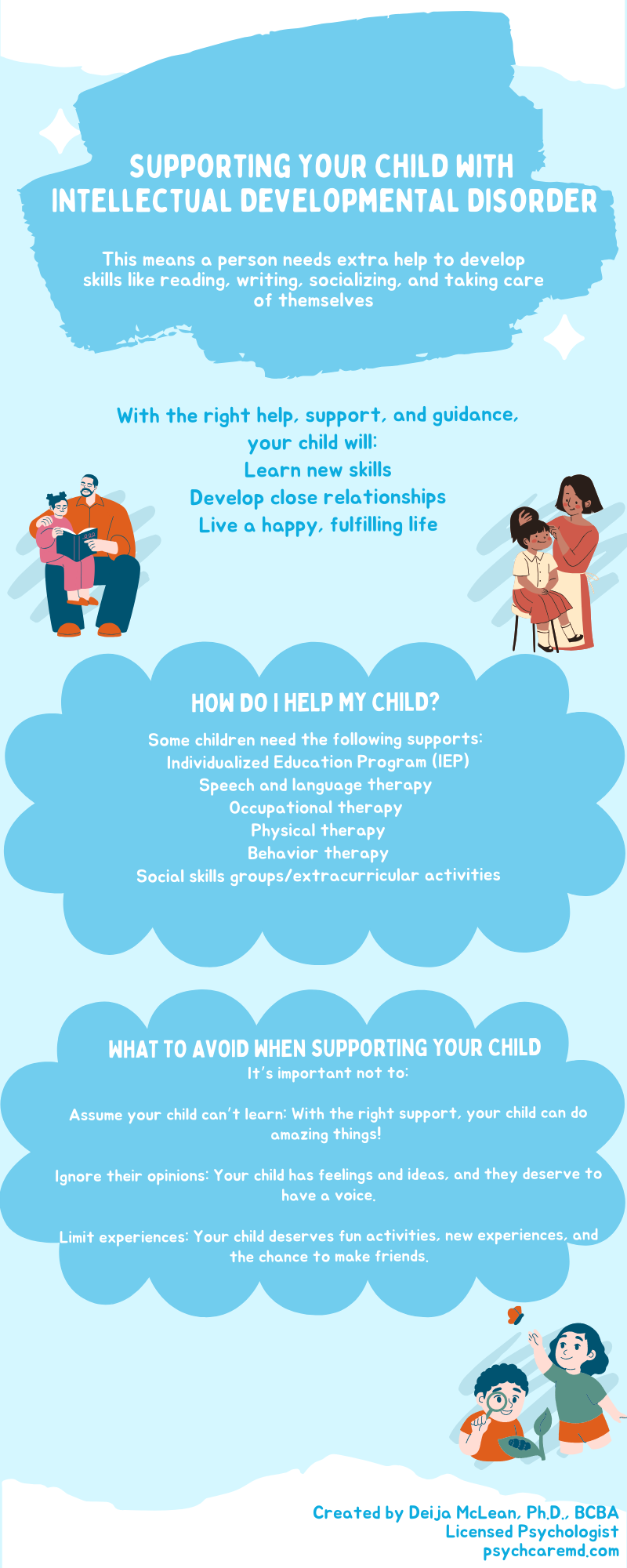Understanding Intellectual Developmental Disorder
Intellectual Developmental Disorder (also called Intellectual Disability) means a person needs extra help to develop skills like reading, writing, socializing, and taking care of themselves. People with this diagnosis may need more time, patience, and support to reach their full potential.
With the right help, your child with Intellectual Disability will:
- Learn new skills
- Build close relationships
- Live a happy, fulfilling life
How Is This Diagnosed?
A psychologist, who is professionally trained to understand how people think and learn, can diagnose Intellectual Disability. To make the diagnosis, the psychologist will:
- Give tests to see how your child is doing in areas like thinking, learning, and schoolwork.
- Look at how your child reached certain milestones, like talking or walking, compared to other children their age.
How Can You Help Your Child at Home?
Here are some ways you can help your child learn and grow at home, depending on their age and needs:
- Reading Together: When you read with your child, point to pictures and name the objects. Ask your child to point to the objects you name.
- Learning Concepts: Teach words like "big," "small," "soft," and "heavy" while playing.
- Memory Games: Play simple memory games with cards or objects to help your child practice remembering.
- Encourage Opinions: Ask your child what they think about things and encourage them to explain their ideas. This helps develop critical thinking.
- Learn About Time: Talk about days of the week and use words like "yesterday" and "tomorrow" during everyday activities, like bedtime.
- Rhyming Games: Play games where you say words that rhyme to help your child with language skills.
Will My Child Need Therapy?
Here are some ways you can help your child learn and grow at home, depending on their age and needs:
- Speech Therapy: Helps your child learn to communicate better.
- Occupational Therapy: Helps your child learn to take care of themselves (like dressing, bathing, and brushing their teeth).
- Physical Therapy: Helps your child with balance and motor skills, like running and jumping.
- Behavior Therapy: Helps your child learn how to manage their emotions and deal with challenges.
What How Can You Help Your Child at Home?
If your child is having trouble in school, talk to their teachers and the school psychologist. They can work with you to make a plan to help your child. Some children need a plan called an Individualized Education Program (IEP), which is a written guide for what your child needs to succeed. Some parts of an IEP might include:
- Specialized Instruction: Extra help with learning, sometimes in a special classroom.
- Accommodations: Changes that help your child learn, like sitting closer to the teacher or taking breaks during the day.
- Modifications: Adjusting the work or expectations for your child, such as giving fewer problems to solve.
- Extended School Year (ESY): Extra learning in the summer to help your child keep up with what they learned during the school year.
- Related Services: Your child may receive therapies (speech, physical) while at school.
- Behavior Intervention Plan (BIP): If your child struggles with certain behaviors, this plan will help them learn better ways to act at school.
What Should I Avoid Doing When Raising a Child with an Intellectual Disability?
It’s important not to:
- Assume your child can’t learn: With the right support, your child can do amazing things.
- Ignore their opinions: Your child has feelings and ideas, and they deserve to have a voice.
- Think therapy is needed all the time: Your child should also have time to relax, play, and be with family.
- Limit experiences: Your child deserves fun activities, new experiences, and the chance to make friends.
Helpful Resources
To begin the journey of supporting your child, reach out to us at PsychCare Psychological Services.
To learn more about supporting your child, here are some websites that might help:

